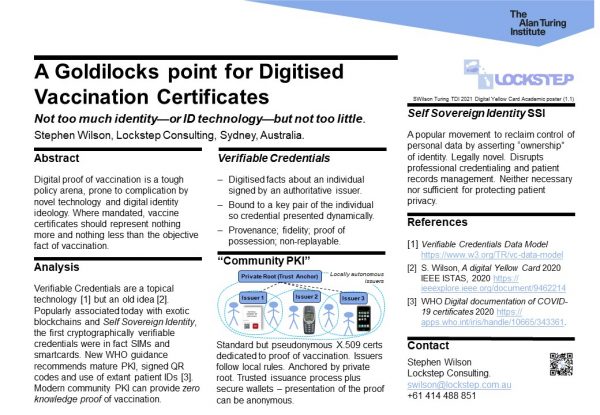A Goldilocks point for Digitised Vaccination Certificates
Poster paper presented to the Turing Trustworthy Digital Identity Conference, Alan Turning Institute, September 13, 2021
This is the text from my audio narrative for the poster.
My poster looks at a sweet spot in digital vaccine certificates. Too little identity and proof of vaccination is insecure; too much identity and the proof threatens privacy.
To set the scene, it worries me that COVID vaccination is seen by some as the killer application for exotic technology or digital ideology. We should not impose these sorts of changes onto health systems especially in developing countries. They disrupt established ways of managing patients and they’re not necessary for privacy.
I do not ignore that vaccination mandates is a tough policy arena, but where mandates are adopted, we have privacy enhancing options. How can we digitize the fact of vaccination, nothing more and nothing less?
The World Health Organization [3] strongly recommends reusing conventional public key infrastructure (PKI) for security, and preserving existing patient IDs. The W.H.O. wants to avoid exotic technologies like blockchain and strident ideologies like self-sovereignty.
Verifiable Credentials are the hottest topic in identity today. Commonly associated with blockchain and the Self Sovereign movement, they really are an old idea. The first cryptographically verifiable credentials were cell phone SIMs and smartcards. The core idea is transaction signing using asymmetric cryptography. From a static signature on the credential, we can tell which authority issued it, and from dynamic signatures created by personal wallets, we can tell who presented a credential. Given strong private key stores, we can be confident a credential was in the right hands when presented, without needing to re-identify the holder. And thus we have a simple zero knowledge proof.
Turning to Community PKI, Public Key Infrastructure was historically a hierarchical scheme for stringent proof of identity but PKI is equally suited to certifying attributes or credentials. Community PKI overlays existing management arrangements, with each issuer following a local credentialing process, such as registration of vaccinations. For a right-sized proof of vaccination, a community PKI certificate means nothing more and nothing less than the fact that the holder has been vaccinated.
A detailed proposal for community PKI certificates is explained in my IEEE Technology & Society paper [2] available here.
References
[1] W3C Verifiable Credentials Data Model. [2] S. Wilson, A digital Yellow Card using Community PKI Certificates 2020 IEEE ISTAS, 2020 [3] World Health Organisation Digital documentation of COVID19 certificates 2020.
